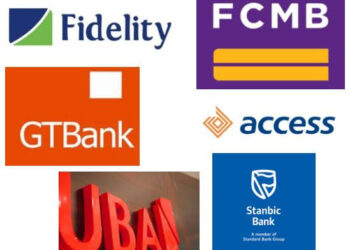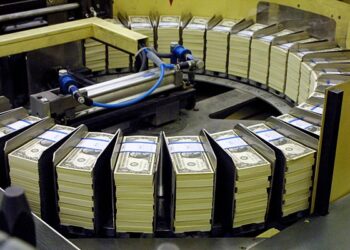 African banks are exposed to environmental risks that may threaten their credit quality and profitability as climate change makes shocks more frequent and severe, according to Moody’s Investors Service.
African banks are exposed to environmental risks that may threaten their credit quality and profitability as climate change makes shocks more frequent and severe, according to Moody’s Investors Service.
Moody’s estimates that the 49 banks it rates across 14 African countries, including Nigeria, have extended almost $218 billion in credit to environmentally sensitive sectors, an amount equivalent to nearly 29% of their total loans, according to Bloomberg.
Threats for the continent’s banks are exacerbated by their outsized holdings of sovereign bonds, particularly for Angolan and Nigerian lenders, Moody’s analysts including Malika Takhtayeva and Peter Mushangwe said in a report Tuesday. Most African sovereigns face substantial risk from rising temperatures, water scarcity and carbon transition, they said.
Here are other comments from Moody’s
“We expect environmental factors will lead to a deterioration of the banks’ credit quality and profitability in the long term if banks do not take measures to prudently manage climate-related and environmental risks.”
Moody’s findings indicate many of Africa’s largest industries, such as oil and gas, mining and transport face high environmental threats, given their high exposure to carbon transition or physical climate risk.
Banks in Democratic Republic of the Congo and South Africa have engaged in extensive lending to the mining industry; banks in Uganda are heavily exposed to farming and fishing, making them vulnerable to droughts and other consequences of climate change.
Few places in the world have greater need for financing to fund water projects and protect the oceans than the Indo-Pacific region, with its vast coastlines and countless islands, many at risk from rising sea levels due to climate change. Enter so-called blue bonds — similar to wildly popular green bonds but focused on such challenges as sustainable fishing and reducing plastic waste. Pioneered in 2018 by the Seychelles, an archipelago in the Indian Ocean, the concept is still relatively rare but catching on as more nations set their sights on improving water resources and marine life. The initiatives add to an already dizzying array of ethically themed debt that’s kept growing.
1. What makes a bond blue?
Basically, it’s when the funds raised are used for a specific purpose that involves water, such as ocean preservation, sustainable fishing or waste management. Blue bonds can be considered a sub-category of environmental, social and governance (ESG) finance, with the “use of proceeds” set out in the offering documents. The securities form part of the so-called blue economy, a concept backed by the United Nations, Asia-Pacific Economic Cooperation and others that blends responsible economic growth and protecting the world’s seas.
2. Who’s selling them?
More from
Japan Ignores Climate Pressure, Eyes New Overseas Coal Units
Moody’s Flags Environmental Risk on $218 Billion of Africa Loans
Oil Industry Titans Vow Climate Collaboration With White House
Coal Giant Pennsylvania to Power Half Its Government With Solar
So far, not many places. The Seychelles issued the world’s first in a private placement that raised $15 million to pay for marine protection and fishery management. A year later, in 2019, Nordic Investment Bank sold its own $234 million, Swedish krona-denominated blue bond so it could support lending to projects focused on waste treatment, preventing water pollution and restoring biodiversity in the Baltic Sea. Two offshore branches of Bank of China Ltd. priced Asia’s first blue notes in the overseas market, raising a combined $961 million-equivalent in September, followed by a $450 million sale from Industrial Bank Co.’s Hong Kong branch two months later. That’s still a drop in the bucket compared with the global green bond market’s total issuance of over $1 trillion, itself just a sliver of the more than $100 trillion bond market. With its many miles of coastlines and vulnerability to climate change, experts say East Asia and the Indo-Pacific region may benefit from this type of financing.
Bloomberg’s Todd Gillespie breaks down bonds, bonds, bonds as they take the spotlight.Source: Quicktake)
3. What are the advantages?
Along with some other ESG bonds, blue debt can sometimes offer a so-called greenium, outperforming the broader market as fund managers around the world boost allocations to such securities. Since pricing late last year, spreads on blue dollar notes sold by the Bank of China tightened more than the broader market of Chinese investment-grade bonds, a Bloomberg Barclays index shows. It’s still early days, with few blue securities on the secondary market so far. But analysts have cited the unique appeal for investors who otherwise have limited options to put money into such projects. The rising tide of ESG enthusiasm is an extra boost.
4. What are the challenges?
So far, issuers have relied on their own definition of what constitutes a “blue” bond, using a combination of their own ESG frameworks and international standards. That means the notes may require more oversight and disclosures on the part of issuers, and demand greater vigilance by investors to avoid a blue version of greenwashing. Blue finance projects may also require multilateral collaboration, given that pollution sources aren’t always local and also because of differing views in places about maritime boundaries. It’s hard for projects that support sustainable fishing or clean oceans to be effective unless other countries also back these efforts. This applies particularly to Southeast Asia where many countries share a coastline or are separated by relatively short stretches of ocean.
5. Who’s interested?
There’s no shortage of demand for more sustainable debt investments and blue bonds should be no different. The list of ocean-focused funds already includes Mirova’s Sustainable Oceans Fund, BNP Paribas’ Aqua fund, and the Credit Suisse Rockefeller Ocean Engagement Fund. Their investments are mostly in water-treatment and fishing-related enterprises that encourage sustainable practices. Pledges from international institutions and states to develop the blue economy are also set to boost demand. The Asian Development Bank, for instance, aims to promote blue-bond issuance through its Oceans Financing Initiative, which will expand its investments and assistance to $5 billion by 2024. The initiative also plans to facilitate revenue guarantees to reduce investor risk.
The Reference Shelf
An ethical debt glossary, and more QuickTakes on green finance, “greenwashing” worries, and why some bonds now have a “greenium.”
How Chanel set a new fashion in environmental bonds.
Concerns about nature are entering sovereign debt markets, backed by the World Bank.
How economists are trying to put a price on biodiversity.
The ADB and the European Investment Bank are working jointly to support blue economy initiatives in the Asia-Pacific region.












